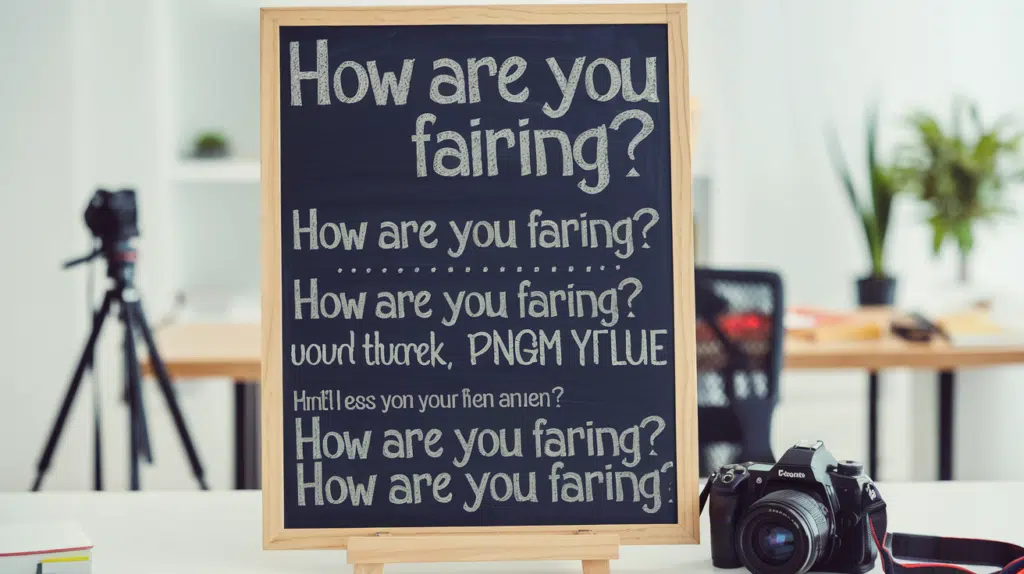In the world of English language nuances, few phrases spark confusion quite like “How are you faring?” versus “How are you fairing?” Despite their similar sounds, these phrases carry distinct meanings and applications.
Understanding the difference between these two terms not only enhances your communication skills but also ensures that your inquiries are both clear and effective.
In this article, we will dive deep into the intricacies of these terms, providing a comprehensive analysis, relatable examples, and practical tips for usage. By the end, you’ll confidently navigate this linguistic minefield, ensuring you ask the right questions in the right context.
What Does Fairing Mean?

Fairing is primarily a noun, most commonly found in technical or engineering contexts. It refers to a structure designed to improve the aerodynamics of vehicles, aircraft, or boats.
Think of fairings as sleek covers that help reduce drag, allowing vehicles to move more efficiently through air or water.
Examples of Fairing in Context
In Aerospace Engineering:
- “The fairing on the rocket minimizes air resistance during launch.”
- This application highlights how fairings contribute to the overall performance of aerospace vehicles.
In Automotive Design:
- “Modern sports cars often include fairings to enhance speed and fuel efficiency.”
- In this case, fairings help vehicles maintain optimal performance on the road.
Everyday Usage of Fairing
While “fairing” is a term you might encounter in specialized discussions, it’s less common in everyday conversation. Most people are not likely to use the term unless they’re talking about vehicles or aerodynamic design.
Fairing vs. Faring: The Distinction
The key takeaway is that “fairing” is associated with structural design and aerodynamics, while “faring” pertains to how one is performing or feeling. The distinction lies in context and usage, making it crucial to understand when to employ each term.
What Does Faring Mean?
On the other hand, is the present participle of the verb “fare.” This verb indicates how someone is doing or performing in a particular situation. When you ask someone “How are you faring?”, you’re inquiring about their well-being, progress, or overall situation.
Examples of Faring in Context
Social Settings:
- “How are you faring in your new job?”
- This question invites the person to share their experiences and challenges in a new work environment.
Health and Recovery:
- “After your surgery, how are you faring?”
- This inquiry reflects genuine concern for someone’s health and recovery progress.
Faring in Everyday Conversation
Unlike “fairing,” the term “faring” is quite common in everyday language. It serves as a warm way to check in on someone’s condition or progress, making it an important phrase in social interaction.
like to read : Which of the Following: Definition + Complete Usage + Grammar – Grammar Beacon
Misunderstanding the Terms
A frequent error occurs when people mistakenly use “fairing” in place of “faring.” This confusion can lead to misunderstandings and unclear communication.
Common Mistakes
- Incorrect: “How are you fairing in your studies?”
- Correct: “How are you faring in your studies?”
Importance of Clarity

Clear communication is vital, especially when asking about someone’s well-being. Using the correct term not only enhances your credibility but also reflects your attentiveness to language nuances.
Tips for Remembering the Difference
Faring as Faring Well: Associate “faring” with the phrase “faring well.” This common phrase connects directly to how someone is doing, making it easier to remember.
Fairing for Flight: Remember that “fairing” relates to structures that aid flight. If you’re discussing something technical or related to vehicles, you’re likely referring to fairing.
Contextual Understanding
When faced with the choice between “fairing” and “faring,” consider the context of your conversation:
- If it involves well-being or performance, use “faring.”
- If discussing aerodynamics or vehicle design, use “fairing.”
The Correct Usage
The grammatically correct phrase to use when checking on someone’s well-being is “How are you faring?” This expression is commonly accepted and understood as a warm inquiry into someone’s situation.
Example in a Conversation
- You: “Hey, how are you faring after your recent move?”
- Friend: “I’m adjusting well, thank you!”
Why Faring is Preferred
Using “faring” in this context not only shows your concern but also reflects a good command of the language. This small distinction can make a significant difference in how your communication is received.
Understanding the Variations
“How Are You Fairing?”
- This usage is incorrect for asking about someone’s well-being.
- Appropriate in contexts discussing aerodynamic structures.
“How Are You Faring?”
- This is the correct phrase for inquiring about someone’s condition.
Contextual Examples
To further clarify these variations, let’s look at practical examples in different scenarios:
Professional Inquiry:
- Manager: “How are you faring with the new client project?”
- This question is focused on the employee’s performance and progress.
Personal Check-in:
- Relative: “How are you faring after your health scare?”
- Here, the focus is on the individual’s well-being.
The Impact of Tone

Using “faring” correctly not only demonstrates your linguistic proficiency but also enhances the tone of your inquiry, making it feel more genuine and caring.
Real-life Situations
Here are a few real-life scenarios where the terms can be applied:
In Academic Settings:
- Teacher: “How are you faring in your classes this semester?”
- This shows concern for a student’s academic performance.
In Friendships:
- Friend: “I heard you started a new hobby. How are you faring with it?”
- A friendly way to check on someone’s engagement and enjoyment.
Enhancing Communication
These examples underscore the importance of using the correct term. When you accurately convey your questions, you promote better understanding and connection with others.
Exploring the Nuances: Examples and Insights
In Job Interviews:
- Interviewer: “How are you faring with the interview process?”
- Here, the focus is on the candidate’s experience during interviews.
In Family Conversations
- Parent: “How are you faring with your new responsibilities at home?”
- This inquiry reflects a family member’s care and concern.
The Role of Context
Understanding the context is essential for determining which term to use. Whether in professional, academic, or personal settings, the right choice can lead to more meaningful interactions.
Detailed Comparison
| Phrase | Usage Context | Example |
| How are you fairing? | Incorrect for well-being | “How are you fairing in your studies?” (Incorrect) |
| How are you faring? | Correct for well-being | “How are you faring in your new job?” (Correct) |
| Fairing in engineering | Refers to structural design | “The fairing on the aircraft reduces drag.” |
Understanding the Implications
These comparisons highlight how critical it is to use “faring” when inquiring about well-being. Missteps in usage can lead to confusion and hinder effective communication.
like to read: Hayday or Heyday: What’s the Right Word to Use? – Grammar Beacon
Practical Insights
Let’s break down the implications of using each term:
Fairing:
- Refers specifically to engineering or aerodynamic contexts, used predominantly in technical discussions.
Faring:
- Relates to well-being and personal performance, often utilized in social interactions.
Clarity and Communication
Using the correct term improves clarity and fosters better communication. The right choice of words can greatly influence the outcome of conversations, making it essential for effective interactions.
Guidelines for Correct Usage
To master the usage of “faring,” consider the following strategies:
- Identify the Context: Determine whether the situation calls for a discussion about well-being or technical aspects.
- Choose Words Wisely: Selecting the correct term will enhance your credibility and clarity.
Practice in Real Conversations: Incorporating these terms into your dialogue will help reinforce your understanding.
Example Conversations
Workplace Setting:
- Colleague: “How are you faring with your deadlines?”
- This shows concern for workload management.
Friendship Setting:
- Friend: “After your big move, how are you faring?”
- This expresses care for someone’s adjustment to a new environment.
20 Points About Using “How Are You Faring?”

- Know the Context: Always identify whether you’re asking about performance or technical structure.
- Use “Faring” for Well-being: Inquire about personal experiences with “How are you faring?”
- Avoid “Fairing” for Well-being: Don’t use “How are you fairing?” in this context.
- Fairing in Technical Discussions: Use “fairing” when discussing vehicles or design.
- Cultural Sensitivity: Be aware of the cultural implications of your inquiries.
- Clarity is Key: Clear language promotes effective communication.
- Avoid Assumptions: Don’t assume everyone knows the difference; clarify when needed.
- Empathy Matters: Show genuine concern when asking how someone is faring.
- Correct Usage Enhances Credibility: Using language correctly builds trust in communication.
- Seek Feedback: Ask for clarification if unsure about terminology.
- Practice Makes Perfect: Regularly use both terms in conversation to reinforce learning.
- Use Contextual Clues: Identify words around “faring” or “fairing” to determine their meaning.
- Stay Updated: Language evolves; keep learning about usage.
- Reflect on Your Experiences: Consider your own faring when asking others.
- Use Examples: Provide examples to clarify your inquiries.
- Be Mindful of Tone: Your tone can influence how your question is received.
- Don’t Overthink: Focus on the conversation rather than stressing over terminology.
- Learn from Mistakes: If you misuse a term, reflect and improve next time.
- Encourage Open Dialogue: Foster an environment where people can discuss their faring openly.
- Celebrate Small Wins: Acknowledge your progress in mastering language nuances.
Conclusion
In conclusion, mastering the difference between “How are you faring?” and “How are you fairing?” is essential for effective communication. While both terms may sound similar, their meanings and applications are vastly different.
By understanding these distinctions and incorporating them into your conversations, you can enhance your language skills and foster more meaningful connections with others. Remember, the next time you check in on someone, opt for the phrase” to convey genuine concern for their well-being.
As you continue to navigate the rich tapestry of the English language, let this knowledge empower you in your journey toward clear and effective communication.

James Logan is a seasoned blogger and language enthusiast behind Grammar Beacon. With years of experience in grammar and writing, James shares his expertise through insightful and engaging content. His passion for clear communication and linguistic precision shines in every post, making complex grammar concepts accessible and enjoyable for readers. Follow James for expert advice and tips to refine your writing skills.







